Thomas James Richards, Diaries, Transcript Vol. 3, 26 January to 8 November 1916 - Part 14
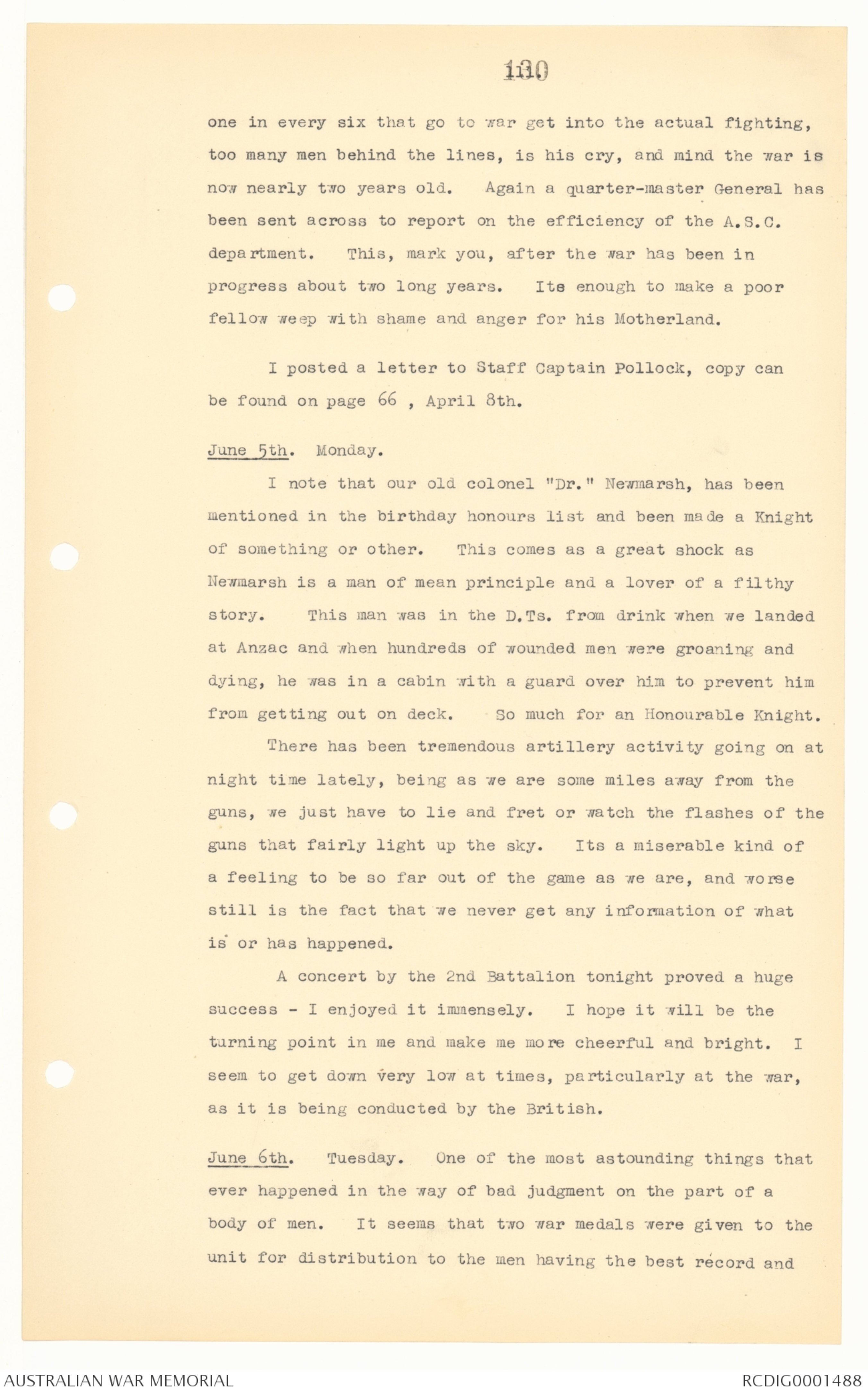
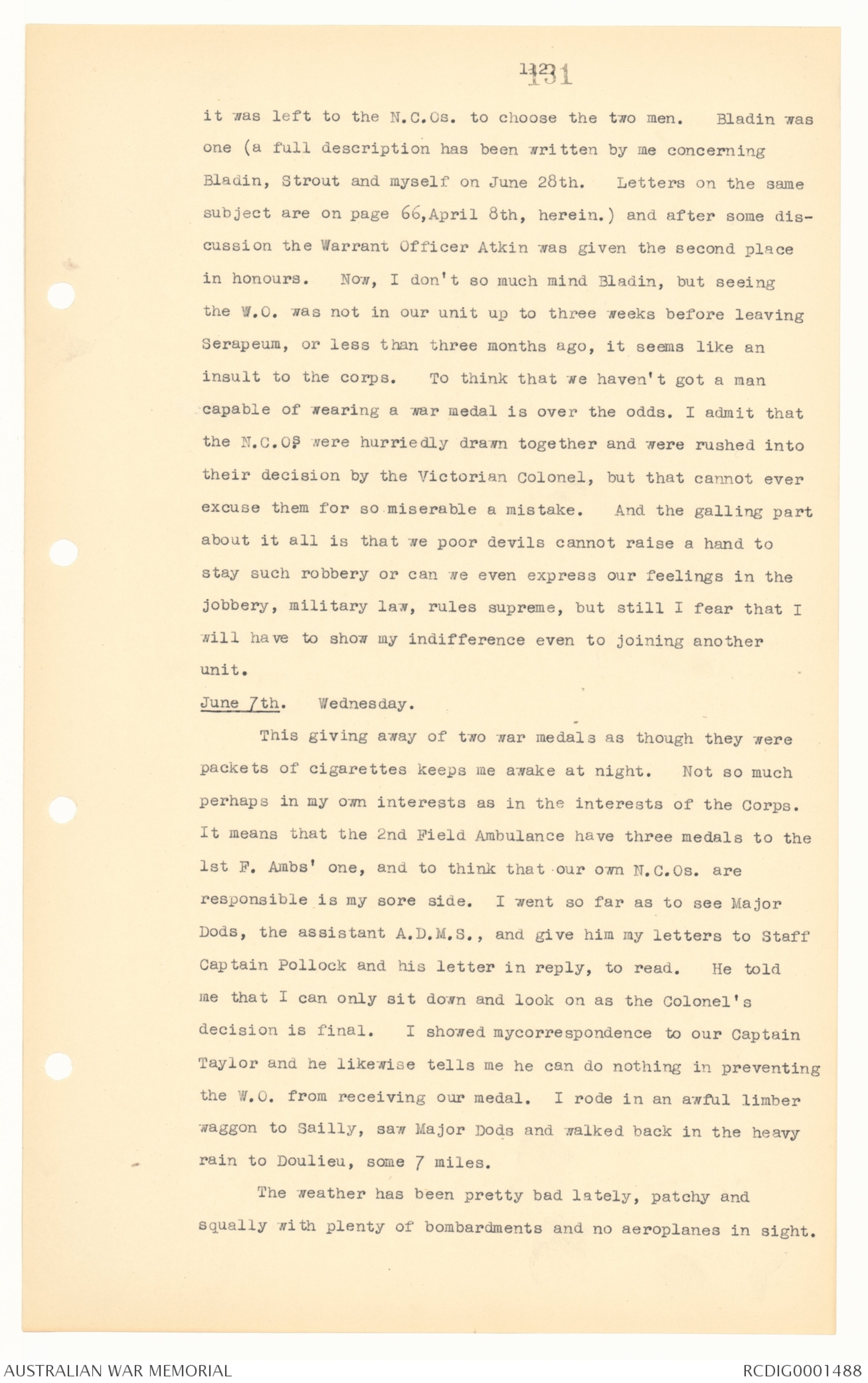
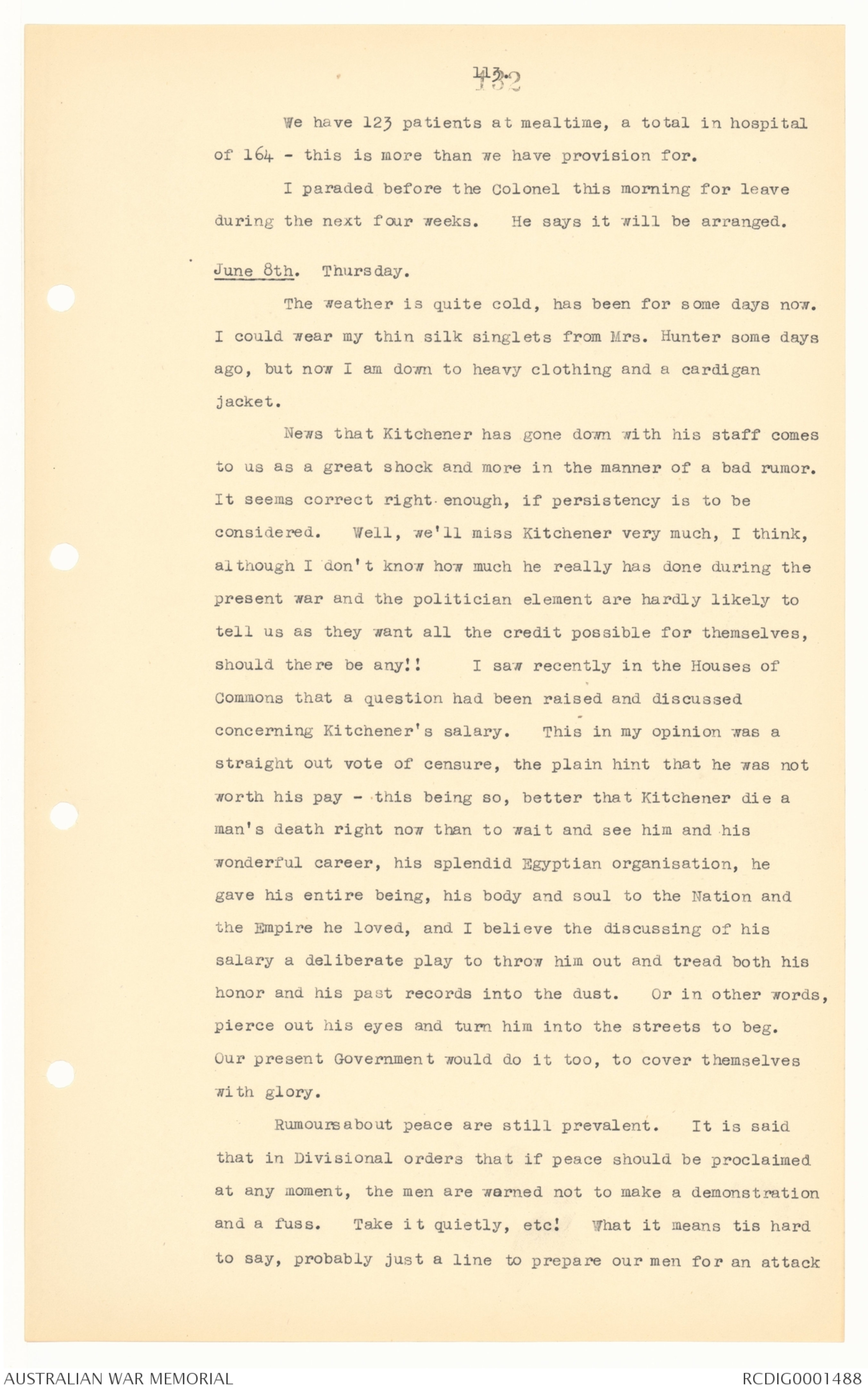
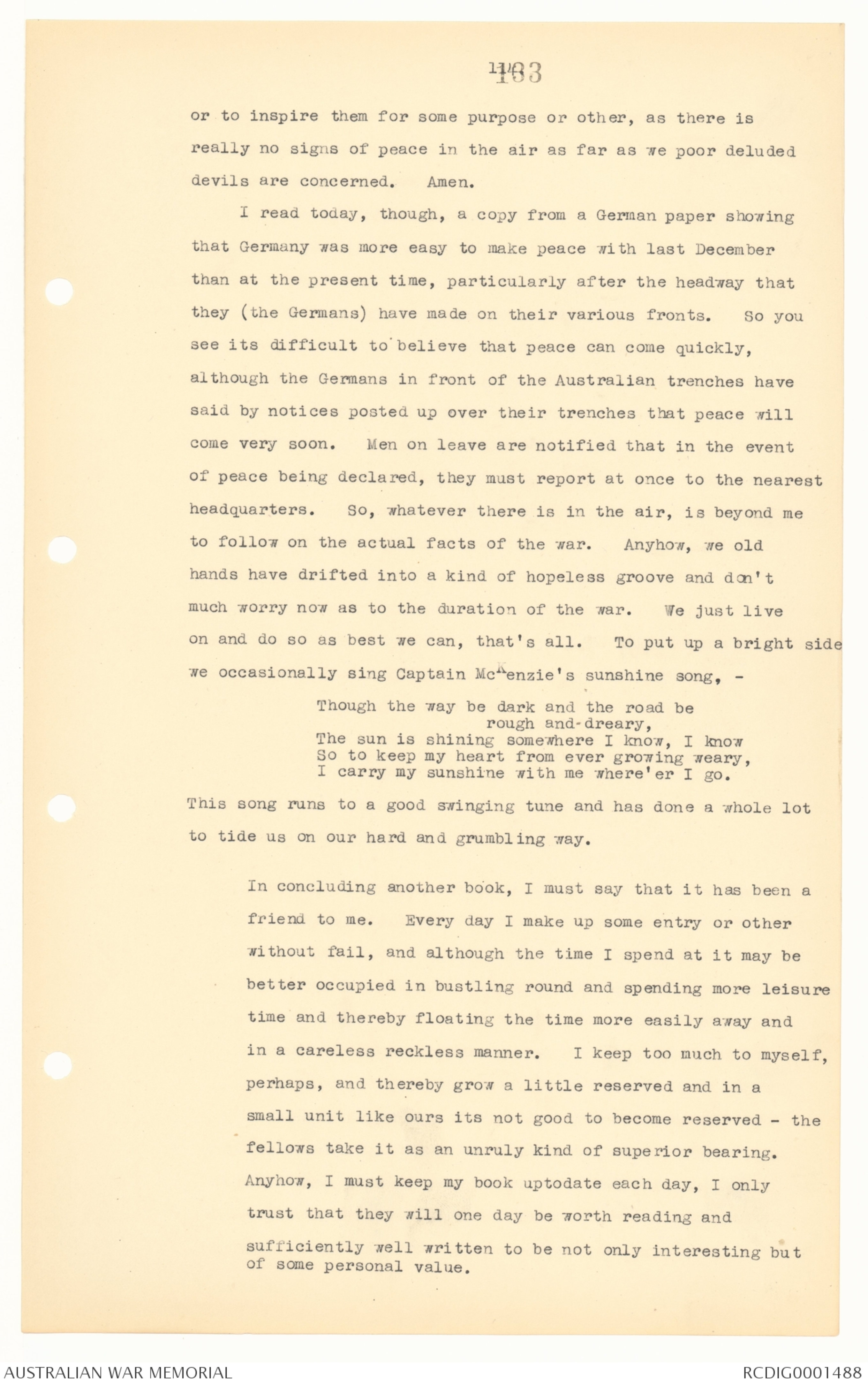
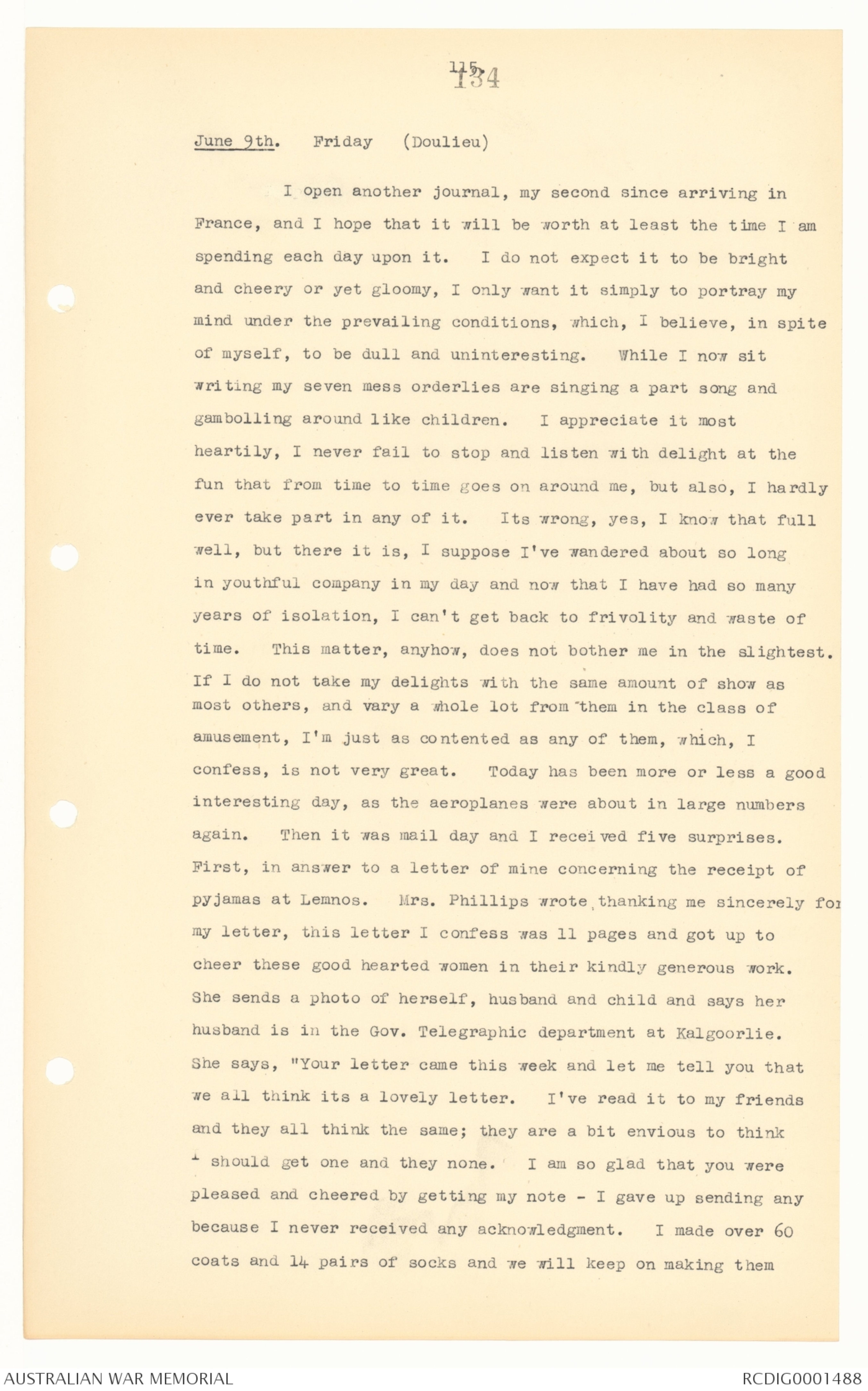
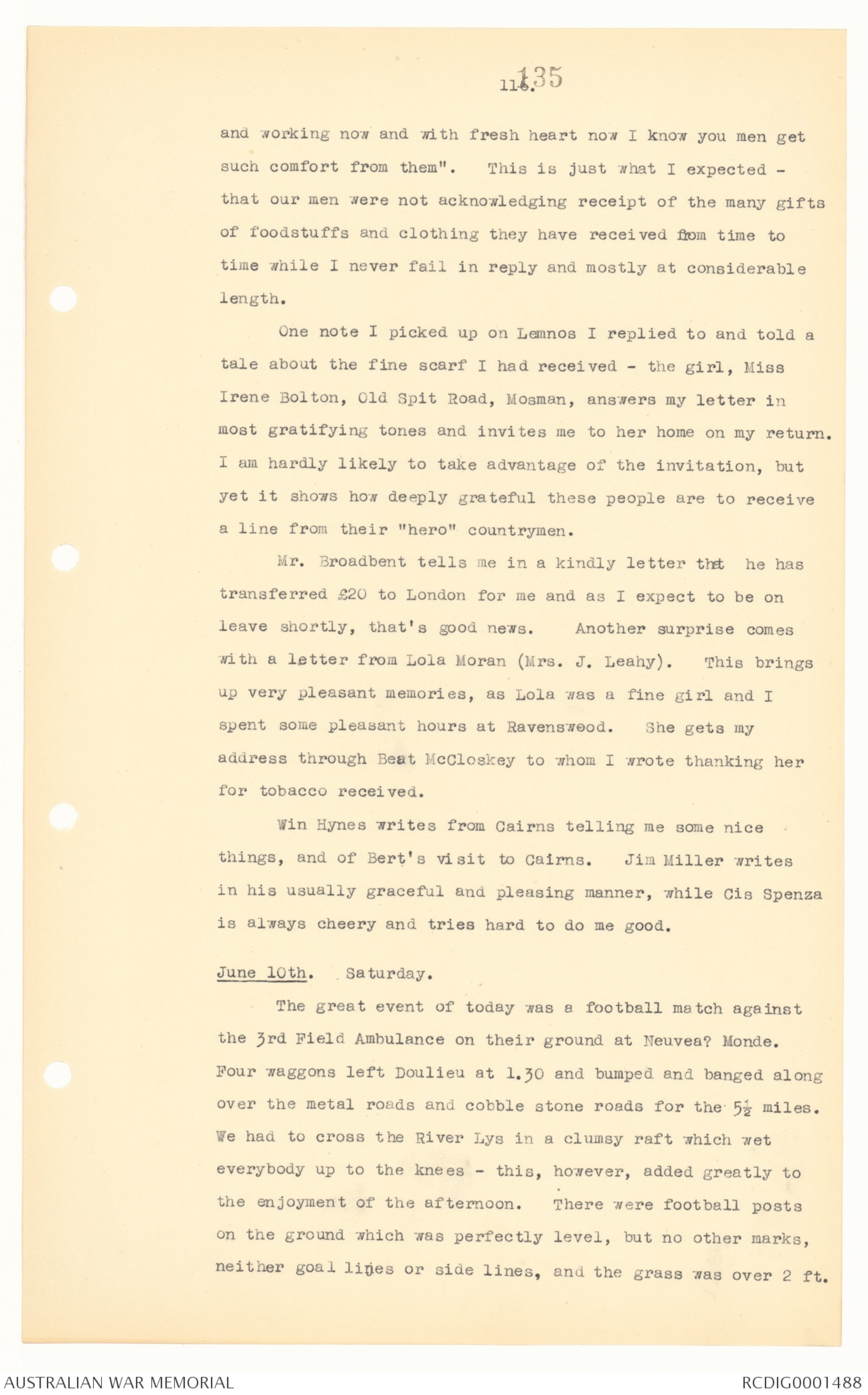
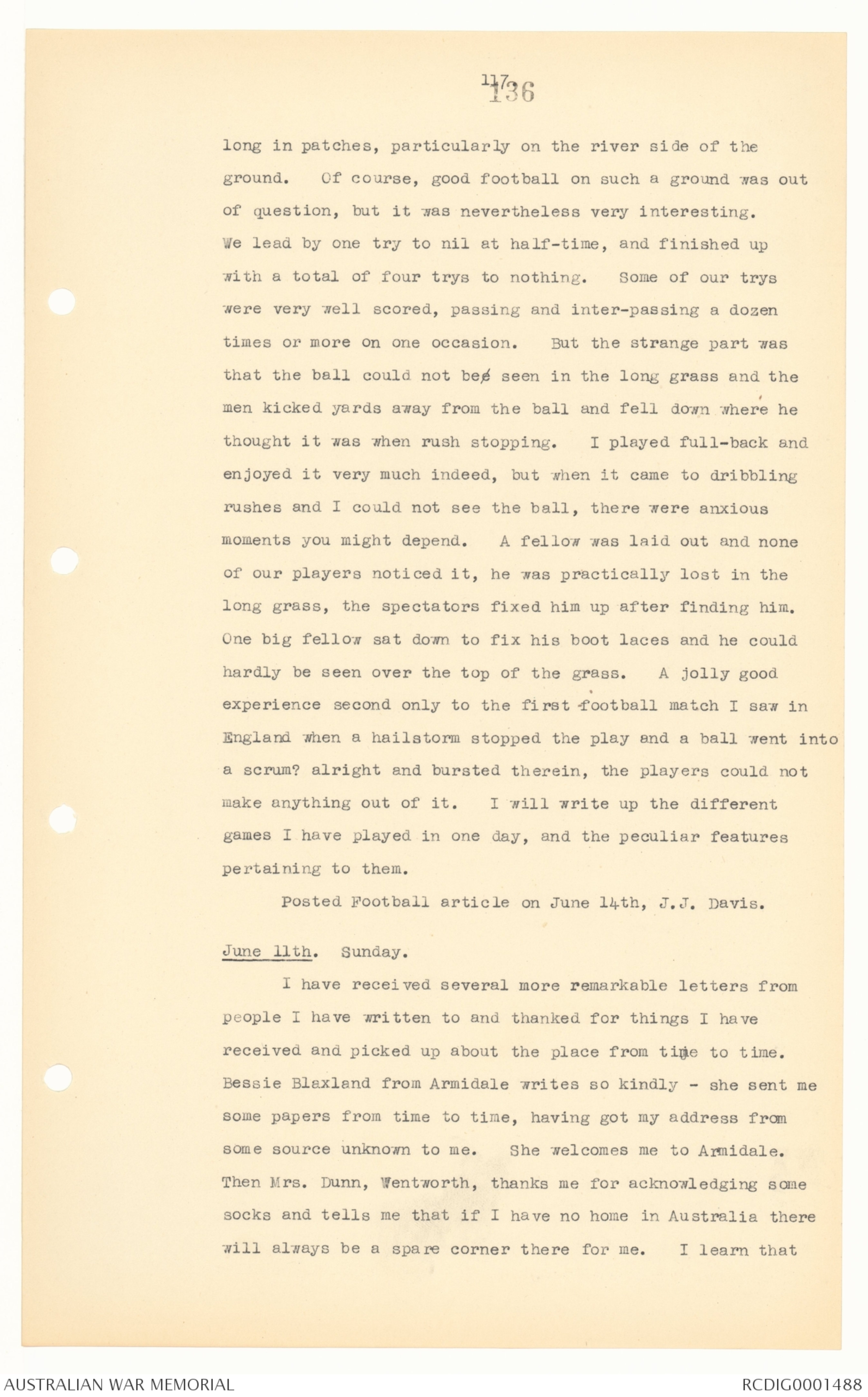
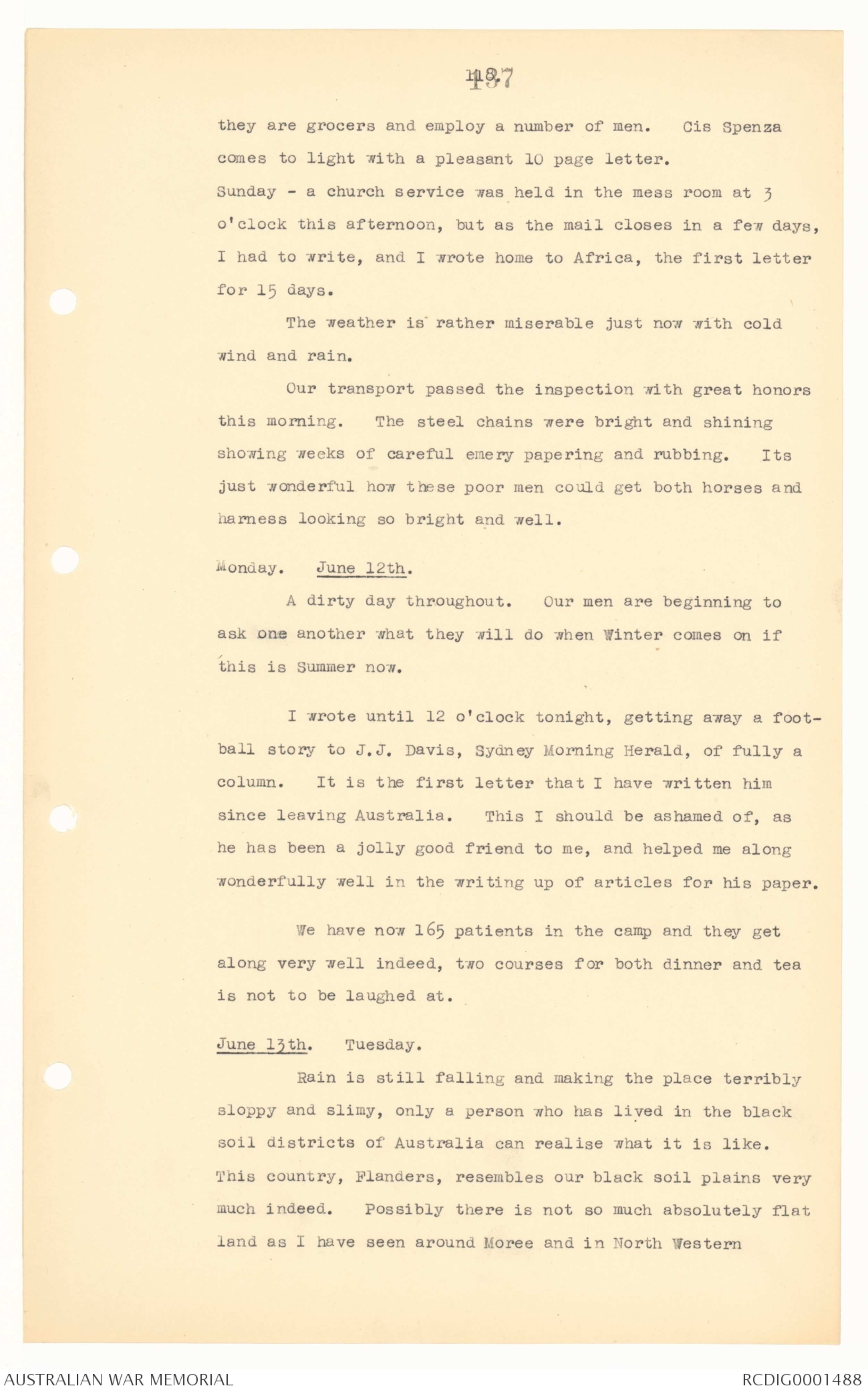
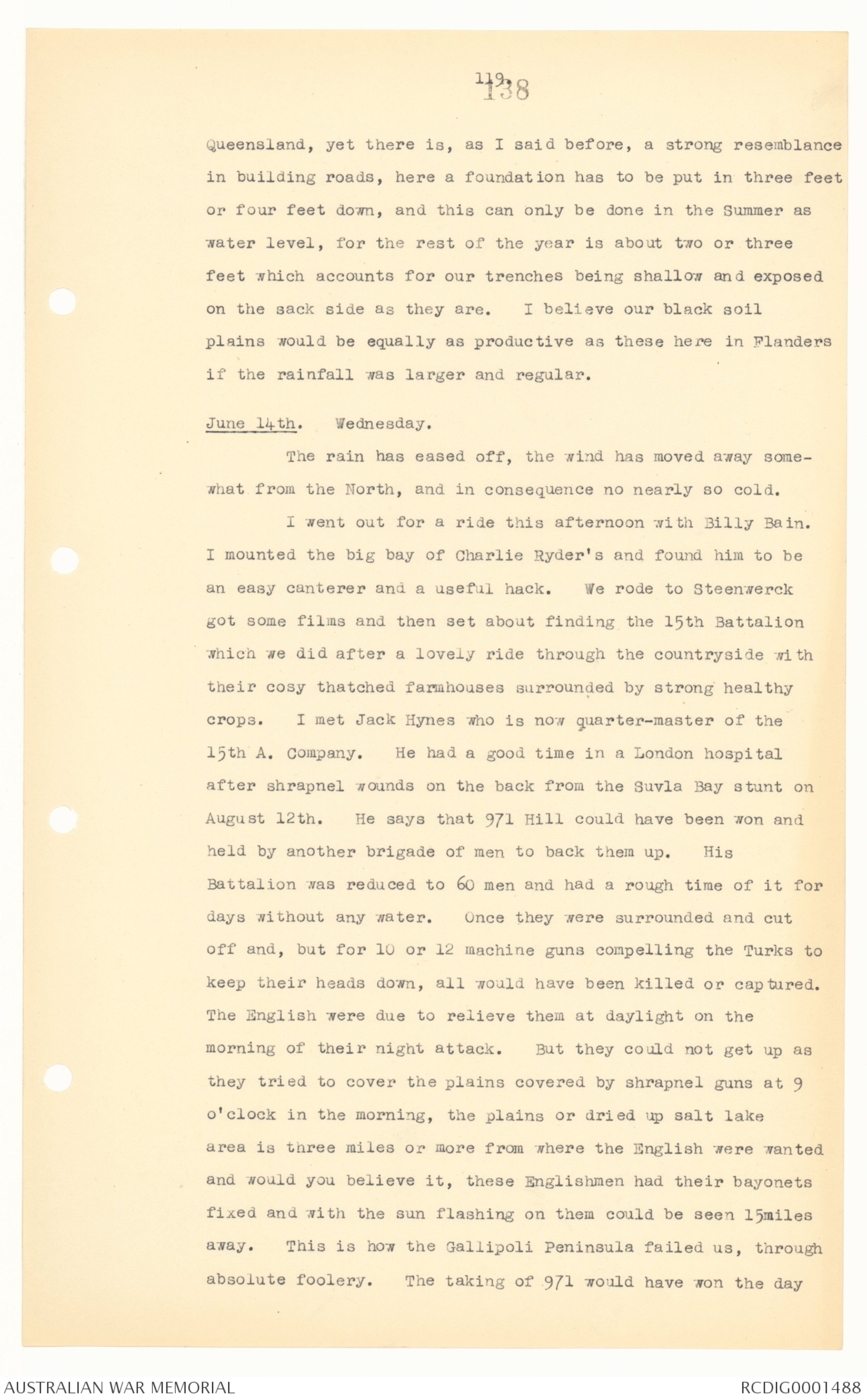
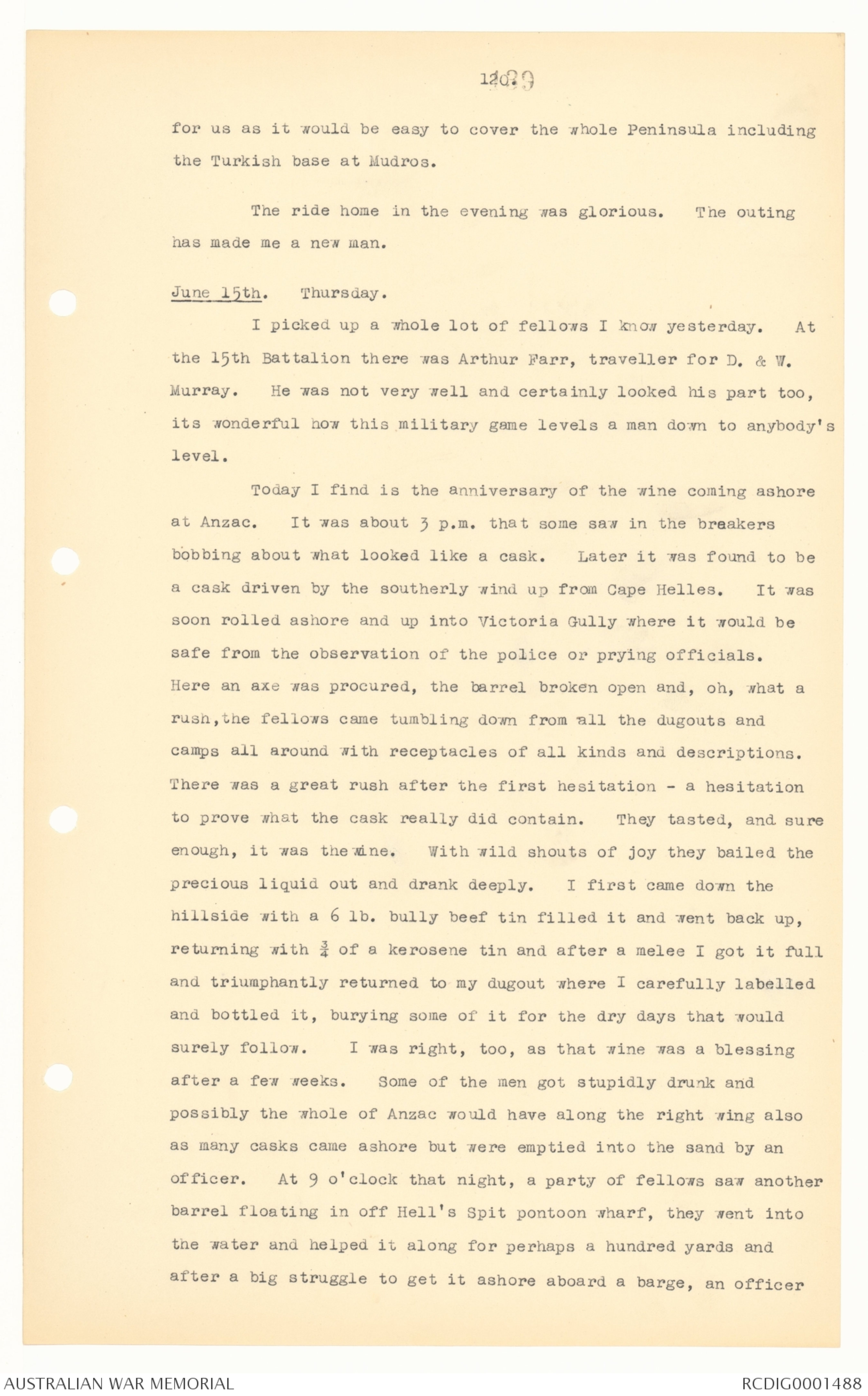
111. 130
one in every six that go to war get into the actual fighting,
too many men behind the lines, is his cry, and mind the war is
now nearly two years old. Again a quarter-master General has
been sent across to report on the efficiency of the A.S.C.
department. This, mark you, after the war has been in
progress about two long years. Its enough to make a poor
fellow weep with shame and anger for his Motherland.
I posted a letter to Staff Captain Pollock, copy can
be found on page 66 , April 8th.
June 5th. Monday.
I note that our old colonel "Dr." Newmarsh, has been
mentioned in the birthday honours list and been made a Knight
of something or other. This comes as a great shock as
Newmarsh is a man of mean principle and a lover of a filthy
story. This man was in the D.Ts. from drink when we landed
at Anzac and when hundreds of wounded men were groaning and
dying, he was in a cabin with a guard over him to prevent him
from getting out on deck. So much for an Honourable Knight.
There has been tremendous artillery activity going on at
night time lately, being as we are some miles away from the
guns, we just have to lie and fret or watch the flashes of the
guns that fairly light up the sky. Its a miserable kind of
a feeling to be so far out of the game as we are, and worse
still is the fact that we never get any information of what
is or has happened.
A concert by the 2nd Battalion tonight proved a huge
success - I enjoyed it immensely. I hope it will be the
turning point in me and make me more cheerful and bright. I
seem to get down very low at times, particularly at the war,
as it is being conducted by the British.
June 6th. Tuesday. One of the most astounding things that
ever happened in the way of bad judgment on the part of a
body of men. It seems that two war medals were given to the
unit for distribution to the men having the best record and
112. 131
it was left to the N.C.Os. to choose the two men. Bladin was
one (a full description has been written by me concerning
Bladin, Strout and myself on June 28th. Letters on the same
subject are on page 66,April 8th, herein.) and after some discussion
the Warrant Officer Atkin was given the second place
in honours. Now, I don’t so much mind Bladin, but seeing
the W.O. was not in our unit up to three weeks before leaving
Serapeum, or less than three months ago, it seems like an
insult to the corps. To think that we haven't got a man
capable of wearing a war medal is over the odds. I admit that
the N.C.0.s were hurriedly drawn together and were rushed into
their decision by the Victorian Colonel, but that cannot ever
excuse them for so miserable a mistake. And the galling part
about it all is that we poor devils cannot raise a hand to
stay such robbery or can we even express our feelings in the
jobbery, military law, rules supreme, but still I fear that I
will have to show my indifference even to joining another
unit.
June 7th. Wednesday.
This giving away of two war medals as though they were
packets of cigarettes keeps me awake at night. Not so much
perhaps in my own interests as in the interests of the Corps.
It means that the 2nd Field Ambulance have three medals to the
Ist F. Ambs' one, and to think that our own N.C.Os. are
responsible is my sore side. I went so far as to see Major
Dods, the assistant A.D.M.S., and give him my letters to Staff
Captain Pollock and his letter in reply, to read. He told
me that I can only sit down and look on as the Colonel's
decision is final. I showed my correspondence to our Captain
Taylor and he likewise tells me he can do nothing in preventing
the W.O. from receiving our medal. I rode in an awful limber
waggon to Sailly, saw Major Dods and walked back in the heavy
rain to Doulieu, some 7 miles.
The weather has been pretty bad lately, patchy and
squally with plenty of bombardments and no aeroplanes in sight.
113. 132
We have 123 patients at mealtime, a total in hospital
of 164 - this is more than we have provision for.
I paraded before the Colonel this morning for leave
during the next four weeks. He says it will be arranged.
June 8th. Thursday.
The weather is quite cold, has been for some days now.
I could wear my thin silk singlets from Mrs. Hunter some days
ago, but now I am down to heavy clothing and a cardigan
jacket.
News that Kitchener has gone down with his staff comes
to us as a great shock and more in the manner of a bad rumor.
It seems correct right enough, if persistency is to be
considered. Well, we'll miss Kitchener very much, I think,
although I don't know how much he really has done during the
present war and the politician element are hardly likely to
tell us as they want all the credit possible for themselves,
should there be any!! I saw recently in the Houses of
Commons that a question had been raised and discussed
concerning Kitchener's salary. This in my opinion was a
straight out vote of censure, the plain hint that he was not
worth his pay - this being so, better that Kitchener die a
man's death right now than to wait and see him and his
wonderful career, his splendid Egyptian organisation, he
gave his entire being, his body and soul to the Nation and
the Empire he loved, and I believe the discussing of his
salary a deliberate play to throw him out and tread both his
honor and his past records into the dust. Or in other words,
pierce out his eyes and turn him into the streets to beg.
Our present Government would do it too, to cover themselves
with glory.
Rumours about peace are still prevalent. It is said
that in Divisional orders that if peace should be proclaimed
at any moment, the men are warned not to make a demonstration
and a fuss. Take it quietly, etc! What it means tis hard
to say, probably just a line to prepare our men for an attack
114. 133
or to inspire them for some purpose or other, as there is
really no signs of peace in the air as far as we poor deluded
devils are concerned. Amen.
I read today, though, a copy from a German paper showing
that Germany was more easy to make peace with last December
than at the present time, particularly after the headway that
they (the Germans) have made on their various fronts. So you
see its difficult to believe that peace can come quickly,
although the Germans in front of the Australian trenches have
said by notices posted up over their trenches that peace will
come very soon. Men on leave are notified that in the event
of peace being declared, they must report at once to the nearest
headquarters. So, whatever there is in the air, is beyond me
to follow on the actual facts of the war. Anyhow, we old
hands have drifted into a kind of hopeless groove and don't
much worry now as to the duration of the war. We just live
on and do so as best we can, that's all. To put up a bright side
we occasionally sing Captain McKenzie's sunshine song, -
Though the way be dark and the road be
rough and dreary,
The sun is shining somewhere I know, I know
So to keep my heart from ever growing weary,
I carry my sunshine with me where'er I go.
This song runs to a good swinging tune and has done a whole lot
to tide us on our hard and grumbling way.
In concluding another book, I must say that it has been a
friend to me. Every day I make up some entry or other
without fail, and although the time I spend at it may be
better occupied in bustling round and spending more leisure
time and thereby floating the time more easily away and
in a careless reckless manner. I keep too much to myself,
perhaps, and thereby grow a little reserved and in a
small unit like ours its not good to become reserved - the
fellows take it as an unruly kind of superior bearing.
Anyhow, I must keep my book uptodate each day, I only
trust that they will one day be worth reading and
sufficiently well written to be not only interesting but
of some personal value.
115. 134
June 9th. Friday. (Doulieu)
I open another journal, my second since arriving in
France, and I hope that it will be worth at least the time I am
spending each day upon it. I do not expect it to be bright
and cheery or yet gloomy, I only want it simply to portray my
mind under the prevailing conditions, which, I believe, in spite
of myself, to be dull and uninteresting. While I now sit
writing my seven mess orderlies are singing a part song and
gambolling around like children. I appreciate it most
heartily, I never fail to stop and listen with delight at the
fun that from time to time goes on around me, but also, I hardly
ever take part in any of it. Its wrong, yes, I know that full
well, but there it is, I suppose I've wandered about so long
in youthful company in my day and now that I have had so many
years of isolation, I can't get back to frivolity and waste of
time. This matter, anyhow, does not bother me in the slightest.
If I do not take my delights with the same amount of show as
most others, and vary a whole lot from them in the class of
amusement, I'm just as contented as any of them, which, I
confess, is not very great. Today has been more or less a good
interesting day, as the aeroplanes were about in large numbers
again. Then it was mail day and I received five surprises.
First, in answer to a letter of mine concerning the receipt of
pyjamas at Lemnos. Mrs. Phillips wrote, thanking me sincerely for
my letter, this letter I confess was 11 pages and got up to
cheer these good hearted women in their kindly generous work.
She sends a photo of herself, husband and child and says her
husband is in the Gov. Telegraphic department at Kalgoorlie.
She says, "Your letter came this week and let me tell you that
we all think its a lovely letter. I've read it to my friends
and they all think the same; they are a bit envious to think
I should get one and they none. I am so glad that you were
pleased and cheered by getting my note - I gave up sending any
because I never received any acknowledgment. I made over 60
coats and 14 pairs of socks and we will keep on making them
116. 135
and working now and with fresh heart now I know you men get
such comfort from them". This is just what I expected -
that our men were not acknowledging receipt of the many gifts
of foodstuffs and clothing they have received from time to
time while I never fail in reply and mostly at considerable
length.
One note I picked up on Lemnos I replied to and told a
tale about the fine scarf I had received - the girl, Miss
Irene Bolton, Old Spit Road, Mosman, answers my letter in
most gratifying tones and invites me to her home on my return.
I am hardly likely to take advantage of the invitation, but
yet it shows how deeply grateful these people are to receive
a line from their "hero" countrymen.
Mr. Broadbent tells me in a kindly letter that he has
transferred £20 to London for me and as I expect to be on
leave shortly, that's good news. Another surprise comes
with a letter from Lola Moran (Mrs. J. Leahy). This brings
up very pleasant memories, as Lola was a fine girl and I
spent some pleasant hours at Ravenswood. She gets my
address through Beat McCloskey to whom I wrote thanking her
for tobacco received.
Win Hynes writes from Cairns telling me some nice
things, and of Bert's visit to Cairns. Jim Miller writes
in his usually graceful and pleasing manner, while Cis Spenza
is always cheery and tries hard to do me good.
June 10th. Saturday.
The great event of today was a football match against
the 3rd Field Ambulance on their ground at Neuvea? Monde.
Four waggons left Doulieu at 1.30 and bumped and banged along
over the metal roads and cobble stone roads for the 5½ miles.
We had to cross the River Lys in a clumsy raft which wet
everybody up to the knees - this, however, added greatly to
the enjoyment of the afternoon. There were football posts
on the ground which was perfectly level, but no other marks,
neither goal lines or side lines, and the grass was over 2 ft.
117. 136
long in patches, particularly on the river side of the
ground. Of course, good football on such a ground was out
of question, but it was nevertheless very interesting.
We lead by one try to nil at half-time, and finished up
with a total of four trys to nothing. Some of our trys
were very well scored, passing and inter-passing a dozen
times or more on one occasion. But the strange part was
that the ball could not bee seen in the long grass and the
men kicked yards away from the ball and fell down where he
thought it was when rush stopping. I played full-back and
enjoyed it very much indeed, but when it came to dribbling
rushes and I could not see the ball, there were anxious
moments you might depend. A fellow was laid out and none
of our players noticed it, he was practically lost in the
long grass, the spectators fixed him up after finding him.
One big fellow sat down to fix his boot laces and he could
hardly be seen over the top of the grass. A jolly good
experience second only to the first football match I saw in
England when a hailstorm stopped the play and a ball went into
a scrum? alright and bursted therein, the players could not
make anything out of it. I will write up the different
games I have played in one day, and the peculiar features
pertaining to them.
Posted Football article on June 14th, J.J. Davis.
June 11th. Sunday.
I have received several more remarkable letters from
people I have written to and thanked for things I have
received and picked up about the place from time to time.
Bessie Blaxland from Armidale writes so kindly - she sent me
some papers from time to time, having got my address from
some source unknown to me. She welcomes me to Armidale.
Then Mrs. Dunn, Wentworth, thanks me for acknowledging some
socks and tells me that if I have no home in Australia there
will always be a spare corner there for me. I learn that
118. 137
they are grocers and employ a number of men. Cis Spenza
comes to light with a pleasant 10 page letter.
Sunday - a church service was held in the mess room at 3
o'clock this afternoon, but as the mail closes in a few days,
I had to write, and I wrote home to Africa, the first letter
for 15 days.
The weather is rather miserable just now with cold
wind and rain.
Our transport passed the inspection with great honors
this morning. The steel chains were bright and shining
showing weeks of careful emery papering and rubbing. Its
just wonderful how these poor men could get both horses and
harness looking so bright and well.
Monday. June 12th.
A dirty day throughout. Our men are beginning to
ask one another what they will do when Winter comes on if
this is Summer now.
I wrote until 12 o'clock tonight, getting away a football
story to J.J. Davis, Sydney Morning Herald, of fully a
column. It is the first letter that I have written him
since leaving Australia. This I should be ashamed of, as
he has been a jolly good friend to me, and helped me along
wonderfully well in the writing up of articles for his paper.
We have now 165 patients in the camp and they get
along very well indeed, two courses for both dinner and tea
is not to be laughed at.
June 13th. Tuesday.
Rain is still falling and making the place terribly
sloppy and slimy, only a person who has lived in the black
soil districts of Australia can realise what it is like.
This country, Flanders, resembles our black soil plains very
much indeed. Possibly there is not so much absolutely flat
land as I have seen around Moree and in North Western
119. 138
Queensland, yet there is, as I said before, a strong resemblance
in building roads, here a foundation has to be put in three feet
or four feet down, and this can only be done in the Summer as
water level, for the rest of the year is about two or three
feet which accounts for our trenches being shallow and exposed
on the sack side as they are. I believe our black soil
plains would be equally as productive as these here in Flanders
if the rainfall was larger and regular.
June 14th. Wednesday.
The rain has eased off, the wind has moved away somewhat
from the North, and in consequence no nearly so cold.
I went out for a ride this afternoon with Billy Bain.
I mounted the big bay of Charlie Ryder's and found him to be
an easy canterer and a useful hack. We rode to Steenwerck
got some films and then set about finding the 15th Battalion
which we did after a lovely ride through the countryside with
their cosy thatched farmhouses surrounded by strong healthy
crops. I met Jack Hynes who is now quarter-master of the
15th A. Company. He had a good time in a London hospital
after shrapnel wounds on the back from the Suvla Bay stunt on
August 12th. He says that 971 Hill could have been won and
held by another brigade of men to back them up. His
Battalion was reduced to 60 men and had a rough time of it for
days without any water. Once they were surrounded and cut
off and, but for 10 or 12 machine guns compelling the Turks to
keep their heads down, all would have been killed or captured.
The English were due to relieve them at daylight on the
morning of their night attack. But they could not get up as
they tried to cover the plains covered by shrapnel guns at 9
o'clock in the morning, the plains or dried up salt lake
area is three miles or more from where the English were wanted
and would you believe it, these Englishmen had their bayonets
fixed and with the sun flashing on them could be seen 15miles
away. This is how the Gallipoli Peninsula failed us, through
absolute foolery. The taking of 971 would have won the day
120. 139
for us as it would be easy to cover the whole Peninsula including
the Turkish base at Mudros.
The ride home in the evening was glorious. The outing
has made me a new man.
June 15th. Thursday.
I picked up a whole lot of fellows I know yesterday. At
the 15th Battalion there was Arthur Farr, traveller for D. & W.
Murray. He was not very well and certainly looked his part too,
its wonderful how this military game levels a man down to anybody's
level.
Today I find is the anniversary of the wine coming ashore
at Anzac. It was about 3 p.m. that some saw in the breakers
bobbing about what looked like a cask. Later it was found to be
a cask driven by the southerly wind up from Cape Helles. It was
soon rolled ashore and up into Victoria Gully where it would be
safe from the observation of the police or prying officials.
Here an axe was procured, the barrel broken open and, oh, what a
rush, the fellows came tumbling down from all the dugouts and
camps all around with receptacles of all kinds and descriptions.
There was a great rush after the first hesitation - a hesitation
to prove what the cask really did contain. They tasted, and sure
enough, it was the wine. With wild shouts of joy they bailed the
precious liquid out and drank deeply. I first came down the
hillside with a 6 lb. bully beef tin filled it and went back up,
returning with ¾ of a kerosene tin and after a melee I got it full
and triumphantly returned to my dugout where I carefully labelled
and bottled it, burying some of it for the dry days that would
surely follow. I was right, too, as that wine was a blessing
after a few weeks. Some of the men got stupidly drunk and
possibly the whole of Anzac would have along the right wing also
as many casks came ashore but were emptied into the sand by an
officer. At 9 o'clock that night, a party of fellows saw another
barrel floating in off Hell's Spit pontoon wharf, they went into
the water and helped it along for perhaps a hundred yards and
after a big struggle to get it ashore aboard a barge, an officer
 Not Yet Replaced By AI
Not Yet Replaced By AIThis transcription item is now locked to you for editing. To release the lock either Save your changes or Cancel.
This lock will be automatically released after 60 minutes of inactivity.